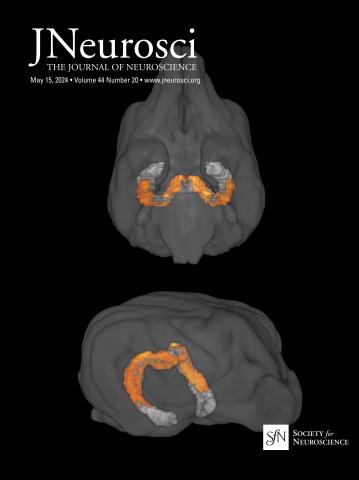早老素的丢失会损害突触传递,并通过不依赖于γ-分泌酶活性的ryanodine受体功能障碍导致轴突变性。
IF 4
2区 医学
Q1 NEUROSCIENCES
引用次数: 0
摘要
早老素突变是家族性阿尔茨海默病(FAD)的最常见原因,但它们破坏神经元功能的机制仍未明确,特别是与γ-分泌酶活性的关系。在秀丽隐杆线虫的研究中,我们发现早老素同源体SEL-12通过一条涉及ryanodine受体RYR-1的通路支持突触传递和轴突完整性。无论是self -12还是ryr-1的功能缺失突变都会减少神经递质释放并导致神经元结构缺陷,而在双突变体中没有额外的损伤,这表明存在共同的途径。γ-分泌酶失活的SEL-12变体或人早老素1的转基因表达可恢复self -12突变体的正常突触传递。值得注意的是,self -12缺失不会改变ryr-1转录物或蛋白水平。这些发现确定了早老素通过ryanodine受体信号传导维持神经元功能的新的γ-分泌酶独立作用,为早老素相关的神经变性提供了新的机制见解,并指出了FAD的潜在治疗策略。早老素突变是家族性阿尔茨海默病的主要原因,通常与突触传递受损和神经变性有关。然而,这些作用背后的分子机制仍然知之甚少。本研究表明,秀丽隐杆线虫中早老素的缺失会损害神经递质释放,并通过不依赖于早老素γ-分泌酶活性的红嘌呤受体(RyRs)功能障碍导致轴突变性。值得注意的是,RyR的表达保持不变,表明早老素可能调节RyR的功能。这些发现揭示了一个γ-分泌酶不依赖的途径,将早老素功能障碍与突触和神经元缺陷联系起来。本研究的发现为阿尔茨海默病的发病机制提供了新的见解。本文章由计算机程序翻译,如有差异,请以英文原文为准。
Presenilin loss impairs synaptic transmission and causes axonal degeneration through ryanodine receptor dysfunction, independent of γ-secretase activity.
Presenilin mutations are the most common cause of familial Alzheimer's disease (FAD), but the mechanisms by which they disrupt neuronal function remain unresolved, particularly in relation to γ-secretase activity. Using C. elegans, we show that the presenilin ortholog SEL-12 supports synaptic transmission and axonal integrity through a pathway involving the ryanodine receptor RYR-1. Loss-of-function mutations in either sel-12 or ryr-1 reduce neurotransmitter release and cause neuronal structural defects, with no additional impairment in double mutants, suggesting a shared pathway. Transgenic expression of a γ-secretase-inactive SEL-12 variant or human presenilin 1 restores normal synaptic transmission in sel-12 mutants. Notably, sel-12 loss does not alter ryr-1 transcript or protein levels. These findings define a novel γ-secretase-independent role for presenilin in maintaining neuronal function via ryanodine receptor signaling, providing new mechanistic insight into presenilin-linked neurodegeneration and pointing to potential therapeutic strategies for FAD.Significance Statement Mutations in presenilins are the major cause of familial Alzheimer's disease and are commonly associated with impaired synaptic transmission and neurodegeneration. However, the molecular mechanisms underlying these effects remain poorly understood. This study shows that loss of presenilin in C. elegans impairs neurotransmitter release and causes axonal degeneration through dysfunction of ryanodine receptors (RyRs), independent of presenilin's γ-secretase activity. Notably, RyR expression remains unchanged, suggesting that presenilins likely regulate RyR function. These findings uncover a γ-secretase-independent pathway linking presenilin dysfunction to synaptic and neuronal deficits. The findings of this study offer new insight into the pathogenesis of Alzheimer's disease.
求助全文
通过发布文献求助,成功后即可免费获取论文全文。
去求助
来源期刊

Journal of Neuroscience
医学-神经科学
CiteScore
9.30
自引率
3.80%
发文量
1164
审稿时长
12 months
期刊介绍:
JNeurosci (ISSN 0270-6474) is an official journal of the Society for Neuroscience. It is published weekly by the Society, fifty weeks a year, one volume a year. JNeurosci publishes papers on a broad range of topics of general interest to those working on the nervous system. Authors now have an Open Choice option for their published articles
 求助内容:
求助内容: 应助结果提醒方式:
应助结果提醒方式:


